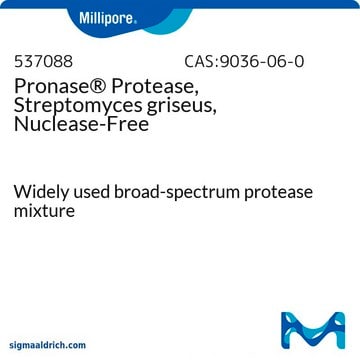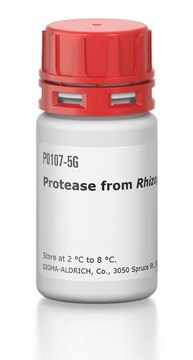53702
Pronase® Protease, Streptomyces griseus
Synonym(s):
Pronase® powder
About This Item
Recommended Products
form
lyophilized
Quality Level
specific activity
≥45,000 proteolytic units/g dry wt
manufacturer/tradename
Calbiochem®
storage condition
OK to freeze
desiccated (hygroscopic)
solubility
water: 10 mg/mL
shipped in
ambient
storage temp.
2-8°C
General description
Warning
Unit Definition
Physical form
Reconstitution
Other Notes
Legal Information
Signal Word
Danger
Hazard Statements
Precautionary Statements
Hazard Classifications
Eye Irrit. 2 - Resp. Sens. 1 - Skin Irrit. 2 - STOT SE 3
Target Organs
Respiratory system
Storage Class Code
11 - Combustible Solids
WGK
WGK 2
Regulatory Listings
Regulatory Listings are mainly provided for chemical products. Only limited information can be provided here for non-chemical products. No entry means none of the components are listed. It is the user’s obligation to ensure the safe and legal use of the product.
JAN Code
53702-50KU:
53702-25KU:
53702-500KU:
53702-250KU:
53702-10KU:
53702-5000KU:
53702-KU:
53702-3300KU:
53702-3500KU:
53702-1MU:
Certificates of Analysis (COA)
Search for Certificates of Analysis (COA) by entering the products Lot/Batch Number. Lot and Batch Numbers can be found on a product’s label following the words ‘Lot’ or ‘Batch’.
Already Own This Product?
Find documentation for the products that you have recently purchased in the Document Library.
Customers Also Viewed
Our team of scientists has experience in all areas of research including Life Science, Material Science, Chemical Synthesis, Chromatography, Analytical and many others.
Contact Technical Service













